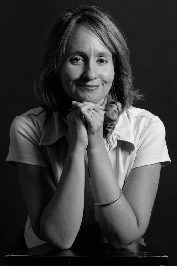With a last name reminiscent of the nine Greek goddesses who presided over the arts and sciences, it seems fitting that Dr. Amy Muse, English Department, is a scholar of both theater and Greece.
From February to June next year, Muse will embark on a four-month scholarly excursion through Greece, thanks to a grant she received through the Fulbright Scholar Program. The program sends 800 U.S. faculty and professionals abroad each year, and is sponsored by the United States Department of State, Bureau of Educational and Cultural Affairs, in cooperation with the Council for International Exchange of Scholars. Recipients are selected on the basis of academic or professional achievement as well as demonstrated leadership potential in their fields.
Muse's research project, titled "Traveling Through Drama," will take her to sites, she explains, "that are well-known to Greeks, as they're part of their national heritage, but are relatively unknown to and unvisited by most Americans." Muse will be based at the National and Kapodistrian University of Athens, where she'll teach just one course, "Shakespearean Tragedy," to allow her time for research-related reading and travel.
Muse said of her career, "Much of my work is exploring the theatrical kinship between drama and tourist attractions and tracing their influence on a tourist culture thematically focused on freedom." As a Fulbright Scholar in Greece, Muse will continue her academic pursuits, studying drama and tourist sites related to the Greek War of Independence (1821-32), and "noting the ways these attractions work their effect on spectators." Among the sites she will visit are a wax museum in Ioannina, where one can view staged scenes of the revolution; the house of Laskarina Bouboulina, a female commander of a revolutionary warship; and the annual Exodus celebration, which commemorates the massacre and destruction of the city Messolonghi in 1826.

- Dr. Amy Muse
Part of her research will be more traditional, too, she said: "reading plays and travel narratives and memoirs, studying sketches and designs."
She will pursue most of this work at the Gennadius Library in Athens, which is a part of the American School of Classical Studies and holds one of the world's most extensive collections of materials on philhellenism, a term, Muse explains, that is used to express love of Greece and support of the revolution, during which Greece fought for independence from the Ottoman Empire.
The Fulbright scholarship will cover Muse's round-trip airfare, living and transportation expenses, books, Greek language classes and other expenses.
Muse says she is "looking forward to cultivating professional relationships and friendships with Greek scholars who can help temper and make more nuanced my understanding of Greek culture and history," as well as the opportunity to teach abroad again – she taught at the University of Glasgow through St. Thomas' Glasgow English Semester program in spring 2005. But even more than that, she "idealistically believes in the program's mission to increase international understanding through education and friendship."






